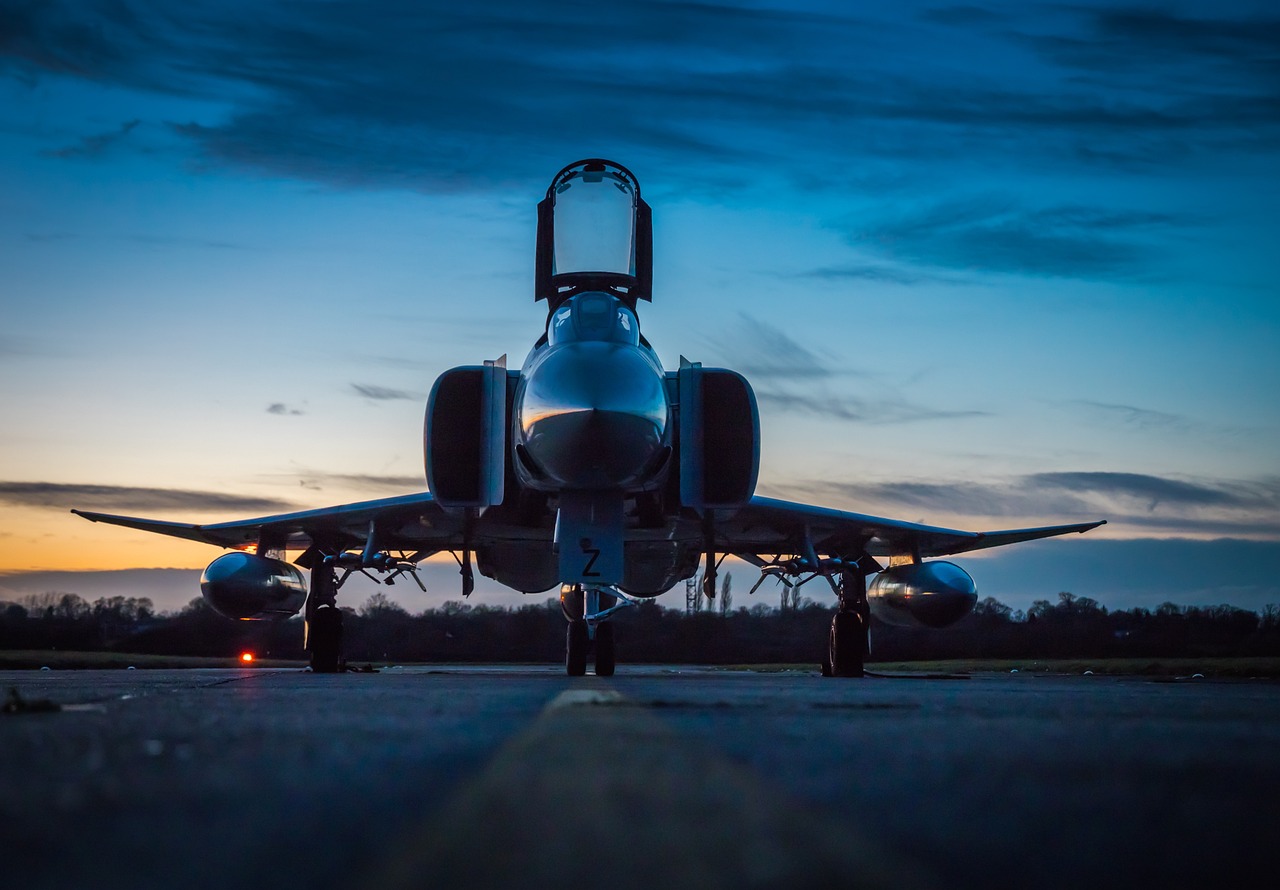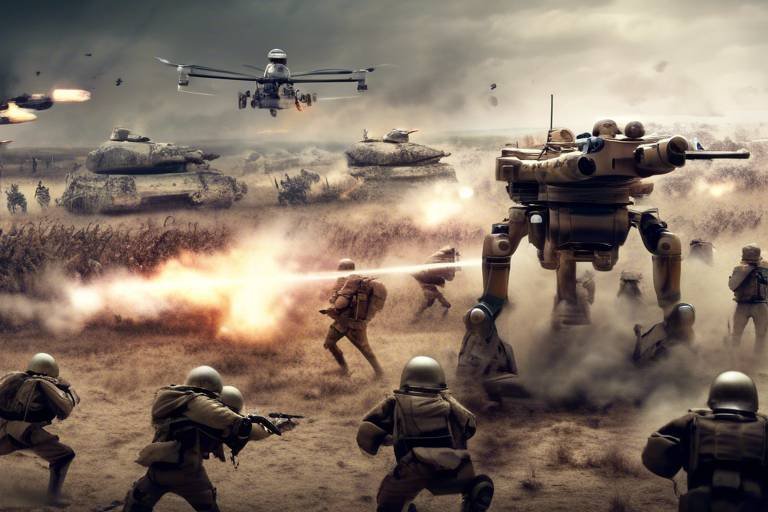Artificial Intelligence: Revolutionizing Battlefield Strategies
In a world where technology evolves at breakneck speed, artificial intelligence (AI) has emerged as a game-changer in military operations. Gone are the days when strategies were solely based on human intuition and experience; today, AI is reshaping how wars are fought, enhancing decision-making processes, and streamlining battlefield strategies. Imagine a scenario where a military commander can analyze vast amounts of data in seconds, gaining insights that would have taken human analysts days or even weeks. This is not science fiction; this is the reality of modern warfare, where AI is not just a tool but a strategic partner on the battlefield.
The integration of AI into military tactics is akin to upgrading from a bicycle to a jet fighter. It provides a significant leap in operational efficiency and effectiveness. With AI, militaries can process real-time data from various sources, including satellites, drones, and ground sensors, allowing for faster and more informed decision-making. This capability is essential in high-stakes situations where every second counts. As a result, commanders can deploy resources more effectively, anticipate enemy movements, and adapt strategies in real time. The question arises: how did we reach this point, and what does it mean for the future of warfare?
The journey began with the recognition that traditional military operations needed an overhaul. The complexity of modern conflicts, characterized by asymmetric warfare and cyber threats, necessitated a new approach. AI technologies such as machine learning, natural language processing, and predictive analytics have become integral to military operations. These technologies enable the analysis of enormous datasets, transforming raw information into actionable intelligence. For instance, AI can identify patterns in enemy behavior, predict potential threats, and even suggest optimal courses of action. It's like having a crystal ball that offers a glimpse into the future of battlefield dynamics.
However, while the advantages of AI in military operations are clear, they also come with challenges. The deployment of autonomous weapons systems, for example, raises ethical and strategic questions. How do we ensure that these systems are used responsibly? What happens if an autonomous weapon makes a mistake? These concerns highlight the need for robust discussions and regulations surrounding the use of AI in warfare. As we navigate this uncharted territory, it is crucial to strike a balance between leveraging technological advancements and maintaining ethical standards.
In conclusion, as we stand on the brink of a new era in military strategy, the role of AI cannot be overstated. It is revolutionizing how battles are fought, enhancing decision-making, and reshaping operational frameworks. The future of warfare will undoubtedly be influenced by these advancements, and understanding their implications will be vital for military leaders, policymakers, and society as a whole. Are we ready to embrace this change, or will we let it dictate the course of our future conflicts?
- How is AI currently being used in military operations?
AI is used for data analysis, decision-making support, and enhancing operational efficiency in various military strategies. - What are the ethical concerns surrounding autonomous weapons?
Ethical concerns include accountability for decisions made by AI systems and the potential for unintended consequences in combat scenarios. - Can AI enhance cybersecurity in military operations?
Yes, AI can detect and respond to cyber threats more effectively, improving national security in the digital realm. - What challenges does AI face in military applications?
Challenges include technological reliability, ethical dilemmas, and the need for international regulations governing its use.

The Role of AI in Modern Warfare
As we step into the future, the integration of artificial intelligence (AI) into military operations is nothing short of revolutionary. Imagine a battlefield where decisions are made in the blink of an eye, where data is analyzed faster than any human could possibly comprehend. This is not science fiction; this is the new reality of modern warfare. AI technologies are reshaping how wars are fought, enabling faster decision-making and significantly improving operational efficiency.
One of the most striking aspects of AI in warfare is its ability to process vast amounts of information quickly. In traditional military operations, commanders often relied on a combination of intuition, experience, and sometimes outdated intelligence. However, with AI, they can now leverage real-time data analysis to make informed decisions. This means that in a high-stakes environment, a commander can receive instant feedback on troop movements, potential threats, and even weather conditions, all thanks to AI algorithms that sift through data at lightning speed.
Moreover, AI can enhance situational awareness on the battlefield. Picture a scenario where drones are deployed to gather intelligence. These drones, equipped with AI, can autonomously identify enemy positions, assess threats, and even suggest tactical maneuvers. This level of autonomy not only saves time but also reduces the cognitive load on human operators, allowing them to focus on strategic planning rather than getting bogged down in the minutiae of data.
However, the role of AI in modern warfare is not without its challenges. As we embrace these technologies, we must also consider the implications of reliance on machines for critical decisions. What happens when an AI makes a mistake? Who is held accountable? These questions highlight the need for a careful balance between human oversight and machine efficiency. It’s essential to ensure that while AI enhances our capabilities, it does not replace the critical thinking and moral judgment that only humans can provide.
In summary, the role of AI in modern warfare is transformative. It is reshaping battlefield strategies, enhancing decision-making processes, and improving operational efficiency. As we continue to explore the potential of AI, we must remain vigilant about the ethical implications and ensure that these powerful tools are used responsibly.
- What are the main benefits of AI in military operations? AI enhances decision-making speed, improves data analysis, and increases operational efficiency.
- Are there ethical concerns regarding the use of AI in warfare? Yes, there are significant ethical dilemmas, particularly around accountability and the potential for autonomous systems to make life-and-death decisions.
- How does AI improve situational awareness on the battlefield? AI can analyze real-time data from various sources, providing commanders with immediate insights into enemy positions and potential threats.

Autonomous Weapons Systems
The rise of marks a pivotal shift in the landscape of modern warfare. These advanced technologies, capable of operating without direct human intervention, are designed to execute military tasks with remarkable precision and speed. Imagine a battlefield where drones can identify and engage targets independently, or ground vehicles can navigate hostile terrains without a soldier at the helm. This transformation not only enhances operational effectiveness but also fundamentally alters the dynamics of combat.
However, the integration of these systems into military operations is not without its challenges. The ethical implications of deploying machines that can make life-and-death decisions raise significant concerns. Questions like, "Who is responsible if an autonomous weapon malfunctions?" or "How do we ensure these systems adhere to international laws of warfare?" loom large over military strategists and policymakers alike. The debate surrounding these issues is as complex as the technology itself.
Despite the controversies, the benefits of autonomous systems are hard to ignore. These technologies can operate in environments that are too dangerous for humans, reducing the risk to military personnel. For instance, consider the following advantages:
- Increased Precision: Autonomous systems can utilize advanced algorithms and sensors to identify and engage targets with a level of accuracy that minimizes collateral damage.
- Enhanced Efficiency: By automating routine tasks, these systems free up human soldiers to focus on more strategic and complex operations.
- Operational Continuity: Autonomous systems can function around the clock without the need for rest, providing a continuous presence on the battlefield.
However, the deployment of autonomous weapons is fraught with challenges. One of the primary concerns is technological reliability. These systems must be able to operate in unpredictable environments and make split-second decisions. A malfunction or a miscalculation could lead to catastrophic outcomes, both for military personnel and civilians. Furthermore, the ethical dilemmas surrounding accountability cannot be overlooked. If an autonomous weapon causes unintended harm, who is held responsible? The manufacturer, the military, or the programmer?
The international community must also grapple with urgent regulatory concerns. As autonomous weapons become more prevalent, there is a pressing need for global discussions to establish norms and guidelines governing their use. Without a cohesive framework, the risk of an arms race in autonomous weaponry could escalate, leading to potential conflicts that could have been avoided. Countries must come together to address these issues, ensuring that the deployment of such technologies aligns with humanitarian principles and international law.
In summary, while autonomous weapons systems present exciting opportunities for enhancing military capabilities, they also pose significant challenges that must be carefully navigated. The balance between harnessing innovation and maintaining ethical standards will dictate the future of warfare in ways we are only beginning to understand.
- What are autonomous weapons systems? Autonomous weapons systems are military technologies that can operate without direct human control, capable of identifying and engaging targets independently.
- What are the benefits of using autonomous systems in warfare? They offer increased precision, enhanced efficiency, and operational continuity, allowing for safer and more effective military operations.
- What ethical concerns are associated with autonomous weapons? Key concerns include accountability for malfunctions, adherence to international laws, and the potential for unintended harm to civilians.
- Is there a need for regulation on autonomous weapons? Yes, there is an urgent need for international discussions to establish norms and guidelines to govern the use of these technologies.

Benefits of Autonomous Systems
The advent of autonomous systems in military operations is nothing short of revolutionary. Imagine a battlefield where machines can make split-second decisions, analyze threats, and execute missions with pinpoint accuracy—all without direct human intervention. This is not science fiction; it's the reality of modern warfare. The primary advantage of these systems lies in their ability to operate in environments that are too dangerous for human soldiers. By taking on high-risk tasks, autonomous systems significantly reduce human casualties and allow troops to focus on strategic planning and execution.
Moreover, the speed at which these systems can process information is astonishing. They can analyze vast amounts of data in real-time, providing commanders with a clearer understanding of the battlefield. For instance, an autonomous drone can gather intelligence, identify enemy positions, and relay this information back to command centers faster than any human could. This capability not only enhances situational awareness but also allows for rapid response to emerging threats.
In addition to speed and safety, autonomous systems can also operate continuously without the need for rest. This endurance means that military operations can maintain a constant presence in critical areas, ensuring that no opportunity for intelligence gathering or threat neutralization is missed. Think of them as tireless sentinels, always on the lookout for potential dangers.
Furthermore, the integration of artificial intelligence into these systems allows for advanced learning capabilities. As these machines encounter various scenarios, they can adjust their algorithms to improve future performance. This adaptive learning means that autonomous systems become more effective over time, which is a significant advantage in the ever-evolving landscape of warfare.
To summarize, the benefits of autonomous systems in military contexts can be encapsulated in several key points:
- Reduced Human Risk: Minimizing the number of soldiers in harm's way.
- Increased Operational Efficiency: Faster data processing leads to better decision-making.
- Continuous Operation: Ability to function around the clock without fatigue.
- Adaptive Learning: Improved performance through experience and data analysis.
While the advantages are compelling, it's essential to approach the deployment of these systems with caution. The integration of autonomous technology into military operations must be carefully managed to ensure ethical considerations are addressed, and the potential for misuse is minimized. As we stand on the brink of this new era in warfare, the benefits of autonomous systems present a tantalizing glimpse into the future of military strategy.

Challenges of Implementation
The integration of autonomous weapons systems into military operations is not without its challenges. While these technologies promise enhanced efficiency and reduced human risk, they also introduce a myriad of complexities that military strategists must navigate. One of the most pressing issues is technological reliability. Autonomous systems rely on advanced algorithms and sensors, which, while impressive, are not infallible. Imagine sending a drone into a combat zone only for it to misinterpret a command or fail to recognize a target due to a software glitch. Such errors could lead to catastrophic outcomes, not just for the mission, but for innocent lives as well.
Moreover, the ethical dilemmas surrounding autonomous weapons cannot be overlooked. Who is accountable when an autonomous system makes a decision that results in unintended consequences? This question raises significant moral and legal concerns. The potential for collateral damage increases when machines, rather than humans, make life-and-death decisions. Military leaders are faced with the daunting task of ensuring that these systems operate within the bounds of international law and ethical standards.
Another challenge lies in the training and adaptation of military personnel. As these technologies evolve, so too must the skills of the soldiers who operate them. This necessitates ongoing training programs and a shift in military culture to embrace new technological paradigms. Just as a musician must practice to master their instrument, soldiers must continually adapt to the rapid advancements in AI and autonomous systems. This can be a daunting task, especially in an environment where the stakes are incredibly high.
Furthermore, the cost of implementation can be prohibitive. Developing, testing, and deploying autonomous systems requires significant financial investment and resources. For many military organizations, particularly those in developing nations, this can pose a substantial barrier to entry. The question then arises: how can we ensure that all nations have equitable access to these transformative technologies without exacerbating existing global inequalities?
Lastly, there is a public perception issue that must be addressed. As autonomous weapons systems become more prominent in military discussions, public opinion can sway dramatically. Many people harbor fears about the rise of machines in warfare, often fueled by sensationalized media portrayals. Military organizations must engage in transparent communication with the public to foster trust and understanding about the benefits and safeguards associated with these technologies.
In summary, while the potential benefits of autonomous weapons systems are immense, the challenges of implementation are equally significant. Addressing issues of technological reliability, ethical accountability, personnel training, financial investment, and public perception will be crucial in determining the future of AI in military operations.
- What are autonomous weapons systems?
Autonomous weapons systems are military technologies capable of operating without direct human control, using AI to make decisions in combat scenarios.
- What are the ethical concerns associated with autonomous weapons?
Ethical concerns include accountability for decisions made by machines, the potential for unintended harm, and compliance with international laws.
- How does AI improve military operations?
AI enhances military operations by enabling faster data analysis, improving decision-making, and increasing operational efficiency.
- What challenges do militaries face when implementing AI technologies?
Challenges include technological reliability, ethical dilemmas, personnel training, and financial costs.

Regulatory Concerns
The rapid advancement of autonomous weapons systems has ignited a firestorm of regulatory concerns that cannot be ignored. As these technologies continue to develop at an unprecedented pace, the need for comprehensive regulations becomes increasingly urgent. Without proper oversight, the potential for misuse or unintended consequences could escalate dramatically. One of the primary issues at hand is the question of accountability. If an autonomous weapon system makes a decision that results in harm, who is held responsible? Is it the programmer, the military, or the manufacturer? These questions remain largely unanswered and highlight the complexities of integrating such technologies into military frameworks.
Moreover, the international community must come together to establish norms and guidelines governing the use of autonomous weapons. The lack of a unified regulatory framework could lead to a chaotic arms race, where nations rush to develop more advanced systems without considering the ethical implications. To illustrate this point, consider the following table that outlines key areas of concern regarding the regulation of autonomous weapons:
| Area of Concern | Description |
|---|---|
| Accountability | Determining who is responsible for the actions of autonomous systems. |
| Ethical Implications | Assessing the moral consequences of using machines in lethal decision-making. |
| International Norms | Creating a global consensus on the use and limits of autonomous weapons. |
| Technological Reliability | Ensuring that autonomous systems function correctly and safely in combat. |
In addition to these concerns, there are also significant challenges related to the transparency of AI algorithms used in military applications. The opacity of these systems can lead to a lack of trust among nations and the public, further complicating the regulatory landscape. For instance, if a country deploys an autonomous weapon that operates on a 'black box' algorithm, it may be difficult for others to understand how it makes decisions, raising suspicions and fears of misuse. This lack of transparency could hinder international cooperation and dialogue.
Ultimately, addressing these regulatory concerns requires a collaborative approach that includes governments, military organizations, technology developers, and ethicists. Only through open discussions and shared commitments can we hope to create a framework that ensures the responsible use of autonomous weapons while safeguarding human rights and global stability.
- What are autonomous weapons systems? Autonomous weapons systems are military technologies capable of making decisions and executing actions without human intervention.
- Why are regulatory concerns important? Regulatory concerns are crucial to prevent misuse, ensure accountability, and establish ethical guidelines for the use of autonomous weapons.
- How can international cooperation help? International cooperation can lead to the development of shared norms and regulations, reducing the risk of an arms race and promoting responsible use of technology.

AI in Intelligence Gathering
In today's rapidly evolving battlefield, the role of artificial intelligence (AI) in intelligence gathering has become nothing short of revolutionary. Imagine a world where military strategists can sift through mountains of data in the blink of an eye, extracting crucial insights that inform their next moves. This is not science fiction; it is the reality brought forth by AI technologies. With the ability to analyze vast datasets swiftly and accurately, AI enhances situational awareness, enabling military forces to make informed decisions based on real-time information.
What makes AI so effective in intelligence gathering? One key factor is its capacity to process and interpret data from various sources, including satellite imagery, social media, and intercepted communications. By employing sophisticated algorithms, AI systems can identify patterns and anomalies that human analysts might overlook. This capability is akin to having a super-sleuth on your team, tirelessly working to uncover hidden threats and opportunities.
Furthermore, AI can automate repetitive tasks, allowing human analysts to focus on higher-level strategic thinking. For instance, while AI handles the grunt work of data collection and preliminary analysis, analysts can dedicate their time to interpreting the findings and developing actionable strategies. This synergy between human intuition and machine efficiency creates a powerful dynamic that enhances overall operational effectiveness.
To illustrate the impact of AI in intelligence gathering, consider the following table that highlights key AI applications:
| AI Application | Description | Benefits |
|---|---|---|
| Data Mining | Extracting patterns from large datasets. | Identifies trends and anomalies rapidly. |
| Predictive Analytics | Forecasting potential threats based on historical data. | Enhances proactive measures and preparedness. |
| Natural Language Processing | Analyzing text data from various sources. | Improves understanding of sentiment and context. |
Moreover, the integration of AI in intelligence gathering is not without its challenges. Data privacy and ethical considerations loom large as military organizations navigate the murky waters of surveillance and information collection. The balance between national security and individual rights is a delicate one, requiring careful thought and regulation. As AI continues to evolve, so too must the frameworks that govern its use.
In conclusion, AI is fundamentally transforming the landscape of intelligence gathering in military operations. Its ability to analyze data quickly, automate tasks, and uncover insights is invaluable in a world where information is power. However, as we embrace these advancements, we must also remain vigilant about the ethical implications and ensure that the deployment of AI technologies aligns with our values and principles.
- What is the primary benefit of using AI in intelligence gathering? AI allows for faster data analysis, leading to improved situational awareness and more informed decision-making.
- Are there ethical concerns associated with AI in military intelligence? Yes, there are significant ethical considerations, particularly regarding privacy and surveillance.
- How does AI improve operational efficiency? By automating repetitive tasks, AI frees up human analysts to focus on strategic planning and interpretation of data.

Cyber Warfare and AI
The digital battleground is evolving at an astonishing pace, and at the heart of this transformation is artificial intelligence (AI). In the realm of cyber warfare, AI is not just a tool; it is a game changer. Imagine a scenario where threats are detected and neutralized before they even manifest—this is the promise that AI holds for military and national security operations. By harnessing the power of advanced algorithms and machine learning, military forces can now analyze vast amounts of data in real time, allowing them to stay one step ahead of potential cyber adversaries.
AI's role in cyber warfare can be broken down into several key areas. First and foremost, it enhances threat detection. Traditional security measures often struggle to keep up with the rapid pace of cyber threats. However, AI systems can sift through terabytes of data, identifying patterns and anomalies that human analysts might miss. This capability not only improves situational awareness but also facilitates quicker response times to emerging threats.
Moreover, AI is pivotal in developing response strategies. When a cyber attack is detected, AI can automatically initiate countermeasures, such as isolating affected systems or deploying defensive protocols. This level of automation is crucial in minimizing damage and ensuring that military operations can continue uninterrupted. The speed and efficiency of AI-driven responses can mean the difference between thwarting an attack and suffering significant losses.
However, with great power comes great responsibility. The integration of AI into cyber warfare also introduces a host of challenges and ethical considerations. For instance, the potential for offensive capabilities raises questions about accountability and the rules of engagement. If an AI system autonomously launches a cyber attack, who is held responsible? This is a dilemma that military strategists and policymakers must grapple with as they navigate the complexities of modern warfare.
Furthermore, the reliance on AI in cyber operations necessitates a robust framework for cybersecurity. As AI systems become more prevalent, they also present new vulnerabilities. Adversaries may attempt to exploit weaknesses in these systems, leading to a continuous arms race in the digital domain. Therefore, it is essential for military organizations to invest in securing their AI technologies, ensuring that they are resilient against both external threats and internal failures.
In conclusion, AI's integration into cyber warfare is reshaping the landscape of national security. It provides military forces with unprecedented capabilities in threat detection and response, but it also raises significant ethical and operational challenges. As we move forward, it will be crucial for governments and military leaders to engage in ongoing discussions about the implications of AI in warfare, ensuring that its deployment is guided by clear regulations and ethical standards.
- What is the role of AI in cyber warfare?
AI enhances threat detection and response strategies, allowing for quicker and more efficient handling of cyber attacks. - Are there ethical concerns related to AI in military operations?
Yes, the use of AI raises questions about accountability, especially when autonomous systems are involved in offensive operations. - How does AI improve cybersecurity?
AI systems can analyze large volumes of data to identify vulnerabilities and threats, improving overall cybersecurity measures. - What are the potential risks of using AI in warfare?
Potential risks include the misuse of AI for offensive capabilities and the vulnerability of AI systems to cyber attacks themselves.

Defensive AI Strategies
In today's digital landscape, where cyber threats are evolving at an unprecedented pace, have emerged as a critical component of national security. These strategies leverage the power of artificial intelligence to bolster defenses against a myriad of cyber attacks. Imagine a digital fortress that not only stands tall but also adapts and learns from each attack it encounters. This is the essence of defensive AI, which employs advanced machine learning algorithms to identify, analyze, and mitigate potential threats in real-time.
At the heart of defensive AI strategies is the ability to process vast amounts of data quickly and accurately. Traditional cybersecurity measures often struggle to keep up with the speed and complexity of modern threats. However, with AI, systems can analyze patterns, detect anomalies, and predict potential vulnerabilities before they can be exploited. This proactive approach is akin to having a security guard who not only watches for intruders but also anticipates their every move, making it significantly harder for them to succeed.
Moreover, defensive AI strategies can be categorized into several key components:
- Threat Detection: AI systems continuously monitor network traffic and user behavior to identify suspicious activities. By utilizing algorithms that learn from historical data, these systems can flag unusual patterns that may indicate a cyber attack.
- Incident Response: When a potential threat is detected, AI can automate responses, such as isolating affected systems or blocking malicious IP addresses, thereby minimizing damage and reducing response time.
- Vulnerability Management: AI can assist in identifying weaknesses within software and systems, allowing organizations to patch vulnerabilities before they can be exploited by malicious actors.
One of the most significant advantages of implementing defensive AI strategies is their ability to enhance human decision-making. While AI can process data and identify threats, human cybersecurity experts are still essential for interpreting the results and making strategic decisions. The collaboration between AI and human intelligence creates a robust defense mechanism that is greater than the sum of its parts. It’s like having a seasoned detective who relies on a high-tech surveillance system to crack cases more effectively.
However, the integration of AI into cybersecurity is not without its challenges. Organizations must ensure that their AI systems are continually updated and trained with the latest data to remain effective against emerging threats. Additionally, there is the risk of adversaries using AI to develop more sophisticated attacks, creating an ongoing arms race in the cyber realm. Therefore, the development of defensive AI strategies is not just about implementing technology; it’s about fostering a culture of continuous improvement and vigilance.
In conclusion, as we navigate the complexities of cyber warfare, defensive AI strategies stand out as a beacon of hope. By harnessing the power of artificial intelligence, organizations can enhance their cybersecurity posture, making it increasingly difficult for cybercriminals to breach their defenses. The future of cybersecurity lies in the collaboration between human expertise and AI capabilities, ensuring a safer digital environment for all.
- What are defensive AI strategies? Defensive AI strategies involve using artificial intelligence to detect, analyze, and respond to cyber threats in real-time, enhancing overall cybersecurity.
- How does AI improve threat detection? AI improves threat detection by analyzing large datasets to identify patterns and anomalies that may indicate a cyber attack.
- Can AI completely replace human cybersecurity experts? No, while AI can automate certain tasks, human expertise is essential for interpreting data and making strategic decisions.
- What are the challenges of implementing defensive AI? Challenges include the need for continuous updates, the risk of adversaries using AI against defenses, and ensuring the reliability of AI systems.

Offensive Capabilities
When we think about the battlefield of the future, it’s not just about soldiers armed with rifles or tanks rolling across the terrain. Instead, artificial intelligence (AI) is emerging as a game-changer, particularly in the realm of offensive capabilities. Imagine a world where algorithms can analyze enemy movements in real-time, predict their strategies, and launch counterattacks before a human even has time to blink. This is not science fiction; it's the reality of modern warfare, and it's happening right now.
AI's ability to process vast amounts of data at lightning speed allows military forces to conduct sophisticated offensive operations. For instance, AI can sift through satellite imagery, drone feeds, and intelligence reports to identify critical targets. This capability not only enhances the accuracy of strikes but also minimizes collateral damage, making operations more efficient and ethical. In essence, AI acts like a digital general, capable of making split-second decisions that could turn the tide of battle.
Moreover, AI-driven offensive strategies can utilize machine learning to adapt and evolve. As they engage with enemy systems, these algorithms learn from each encounter, refining their tactics in real-time. This adaptive learning is akin to a chess player who not only understands the game but also learns from each match to become increasingly difficult to beat. In the context of cyber warfare, this means that offensive AI can launch attacks that are not only more precise but also more unpredictable, making it challenging for adversaries to defend against.
However, with great power comes great responsibility. The use of AI in offensive operations raises significant ethical questions. Who is accountable when an AI system makes a mistake? If an autonomous drone misidentifies a target and causes civilian casualties, who bears the blame? These questions highlight the need for robust regulatory frameworks that govern the deployment of AI technologies in warfare.
To illustrate the potential of AI in offensive capabilities, consider the following table that compares traditional military strategies with AI-enhanced operations:
| Aspect | Traditional Military Strategy | AI-Enhanced Operations |
|---|---|---|
| Decision-Making Speed | Hours to Days | Seconds to Minutes |
| Data Analysis | Manual Analysis | Automated, Real-Time Analysis |
| Targeting Accuracy | Variable | High Precision |
| Adaptability | Static Plans | Dynamic Learning |
As we venture further into this new era of warfare, it’s essential to remain vigilant about the implications of AI on offensive capabilities. The potential for misuse or unintended consequences is significant, and it’s crucial that military leaders, policymakers, and technologists engage in ongoing discussions about the ethical use of these powerful tools. Ultimately, while AI can enhance military effectiveness, it should always be balanced with a strong commitment to humanitarian principles and accountability.
- What are the main advantages of using AI in offensive military operations?
AI enhances speed, accuracy, and adaptability, allowing for more effective military strategies while reducing the risk of collateral damage. - Are there ethical concerns regarding AI in warfare?
Yes, there are significant ethical dilemmas, including accountability for mistakes made by autonomous systems and the potential for misuse of AI technologies. - How does AI learn and adapt in combat situations?
AI systems use machine learning algorithms to analyze data from previous encounters, allowing them to refine their tactics and improve decision-making over time. - What regulatory measures are needed for AI in warfare?
International discussions are necessary to establish norms and guidelines governing the deployment and use of AI technologies in military operations.
Frequently Asked Questions
- What is the role of AI in modern warfare?
AI is revolutionizing military tactics by enabling faster decision-making and enhancing operational efficiency. It allows for quick analysis of vast amounts of data, helping strategists make informed choices on the battlefield.
- What are autonomous weapons systems?
Autonomous weapons systems are advanced military technologies that can operate without human intervention. They perform tasks with high precision and speed, which can reduce human risk in combat situations while increasing effectiveness.
- What are the benefits of using autonomous systems in warfare?
These systems enhance operational effectiveness by executing complex tasks quickly and accurately. They can reduce the risk to human soldiers and improve mission success rates, particularly in high-stakes environments.
- What challenges arise from implementing autonomous weapons?
Despite their advantages, challenges include ensuring technological reliability, addressing ethical concerns, and determining accountability in the event of failures or unintended consequences.
- Why are regulatory concerns important for autonomous weapons?
The deployment of autonomous weapons raises significant ethical and legal questions. Establishing international norms and guidelines is crucial to ensure these technologies are used responsibly and do not lead to unintended escalation in conflicts.
- How does AI enhance intelligence gathering?
AI technologies allow militaries to analyze large datasets rapidly, improving situational awareness and strategic planning. This capability enables forces to anticipate threats and make informed tactical decisions.
- What role does AI play in cyber warfare?
AI is essential in cyber warfare, providing advanced threat detection and response strategies. It helps protect critical infrastructure from cyber attacks and enhances national security in the digital landscape.
- What are defensive AI strategies?
Defensive AI strategies utilize machine learning algorithms to identify and mitigate potential cyber threats, improving the resilience of national security systems against attacks.
- How does AI contribute to offensive cyber operations?
AI enhances offensive cyber capabilities, allowing for more sophisticated and targeted attacks. This evolution presents new challenges for traditional defense mechanisms, altering the dynamics of cyber warfare.



















